It is hard to find anyone that doesn’t like cucumbers. Being almost neutral in taste, refreshing, hydrating, and even nutritious a cucumber can be combined with almost everything. It can be used for juices, smoothies, salads, meals, or even plain by itself, all of this just proves its versatility and practicality.
Can guinea pigs eat cucumbers? Guinea pigs can eat cucumbers. In fact, every part of the cucumber is safe for them including the seeds. Cucumbers are a good addition to the guinea pig’s diet but due to the low nutrient value and high water content (95%), they are mostly considered to be a form of refreshment or a treat.
The guinea pigs are herbivores. They certainly have some benefits from eating a cucumber. But just like it is the case with any other foods, there are some risks involved as well.
In the following sections, we will talk about potential benefits, risks, and other factors that cucumbers can have in a guinea pig’s diet. Let’s begin!
Table of Content
Are Cucumbers Good for Guinea Pigs? | Health Benefits
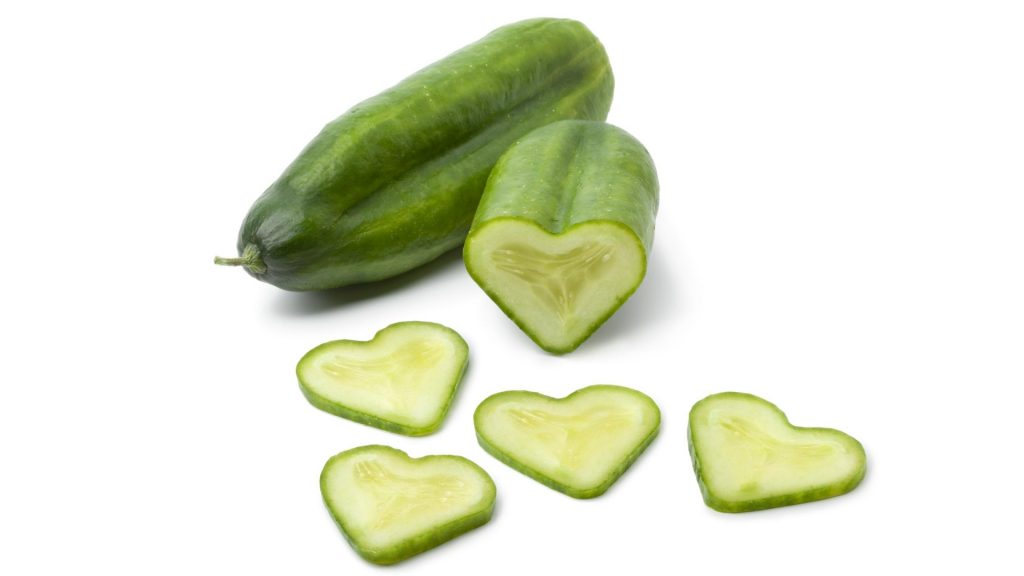
Healthy Weight
The cucumbers won’t make your guinea pig chubby and are light for digestion as well. It is mainly made of water, very low in sugar, calories, and in fat. They are overall amazing for weight control as they provide satiety, which means your guinea pigs will eat less. If you notice that your guinea pig is chubby, introducing cucumbers might be a good idea.
Hydration
Cucumber is a fresh delight for guinea pigs. It will give them the hydration that they desperately need during the summer.
Cardiovascular System and Blood Vessels
The cucumber is low in fat and has zero cholesterol. This is extremely beneficial for the cardiovascular system and blood vessels. Also, there is vitamin K in cucumbers that contributes to healthy blood clotting. With a deficit of this vitamin, the organism is prone to long periods of bleedings during injuries or other health issues.
Antioxidants
In cucumbers, there are nutrients like vitamin A, which acts as an antioxidant and protects the guinea pig’s body from free radical damage. With antioxidants, there is less risk of diseases in general. They also keep the immune system in good shape. Also, vitamin A prevents and fights inflammation, and makes vision, lungs, kidneys, skin, heart, and brain stay in good health.
Prevention From Scurvy
Cucumber has vitamin C which is essential for guinea pigs. They don’t produce it naturally and can’t store it either. This is not a very high amount of vitamin C but it is enough to keep the cavies safe from scurvy. This disease is fatal for them and manifests with the following symptoms: internal bleeding, bad oral health, swollen joints, diarrhea, rough coat, loss of appetite, and more.
Less Stress
B6 vitamin has countless benefits. This vitamin keeps internal and external health in good shape, but it is also well known as a stress-remover. It contributes to calm nerves and better sleep. Also, vitamin B6 makes the skin healthy.
Nutrition Facts of Cucumbers for Guinea Pigs
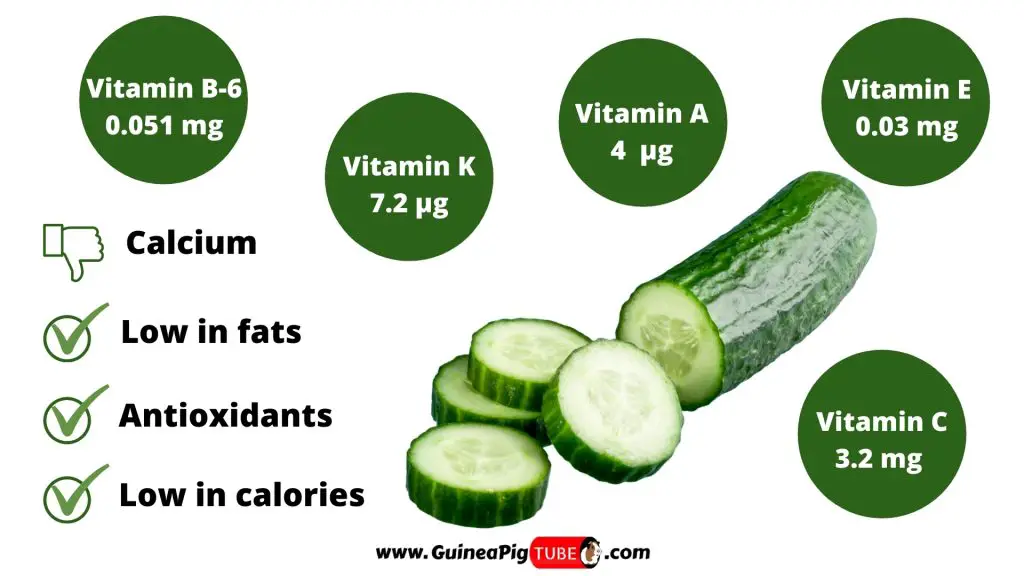
The following are the nutrition facts per 100 g (3 oz) of cucumber:
- Energy – 15 kcal
- Protein – 0.65 g
- Total lipid (fat) – 0.11 g
- Carbs – 3.63 g
- Dietary Fiber – 0.5 g
- Sugars – 1.67 g
- Calcium – 16 mg
- Magnesium – 13 mg
- Phosphorus – 24 mg
- Potassium – 147 mg
- Vitamin C – 2.8 mg
- Vitamin B-6 – 0.04 mg
- Vitamin A – 5 µg
- Vitamin E – 0.03 mg
- Vitamin K – 16.4 µg
- Thiamin – 0.027 mg
- Riboflavin – 0.033 mg
- Niacin – 0.098 mg
- Folate – 7 µg
- Lutein + zeaxanthin – 23 µg
Are Cucumbers Bad for Guinea Pigs? | Possible Risks
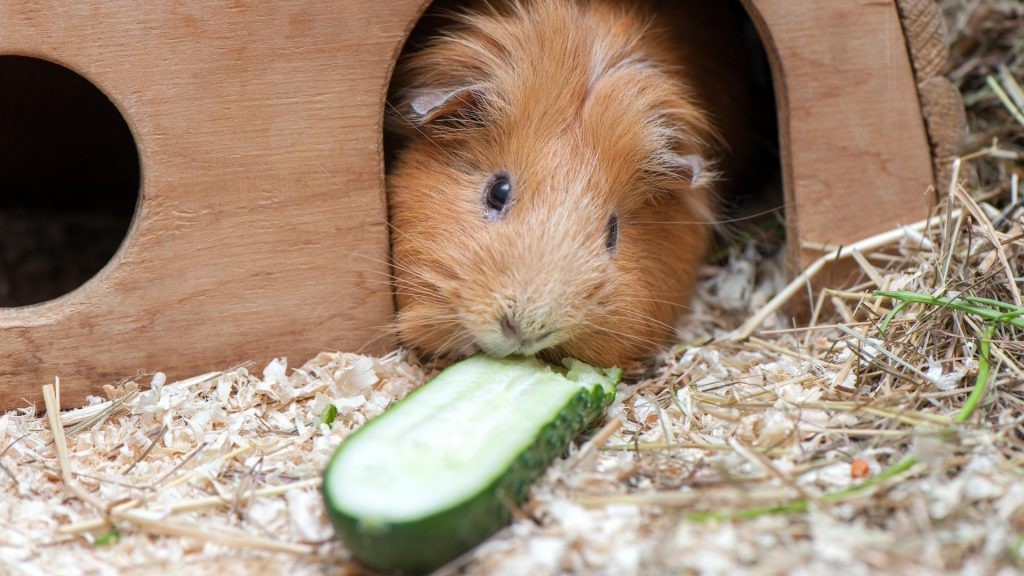
Urinary Problems
There is about 15 mg of calcium per 100 g of cucumber. This is not that much, but it needs precaution because adult guinea pigs don’t really benefit from calcium. This mineral piles up in their urinary tracts and creates bladder or kidney stones. If not treated, this will cause blood in the urine or painful urination which can lead to renal (kidney) failure and even death.
Toxicity
Cucumbers may become bitter in taste and this happens because of the presence of the toxin called cucurbitacin. This toxin is produced naturally by cucumbers and some studies have shown that cucurbitacins can be harmful to both humans and guinea pigs. The more cucurbitacins are in cucumbers the more bitter they are in taste and more poisonous to guinea pigs.
Some of the symptoms of this food poisoning are diarrhea, vomiting, and stomach pain. In order to prevent cucumber poisoning in guinea pigs, be sure to taste the cucumber before giving it to the guinea pig and also feed them only fresh cucumbers.
Some Risk of Diarrhea and Stomach Aches
Cucumber is very tasty to guinea pigs, but it is very watery. If fed in large quantities without other food varieties, it can upset their fragile belly. So try to serve cucumbers along with another food for the guinea pigs because the stomach digests watery foods better when they are combined with something more caloric.
Tips on How Can You Feed Cucumber to Guinea Pigs
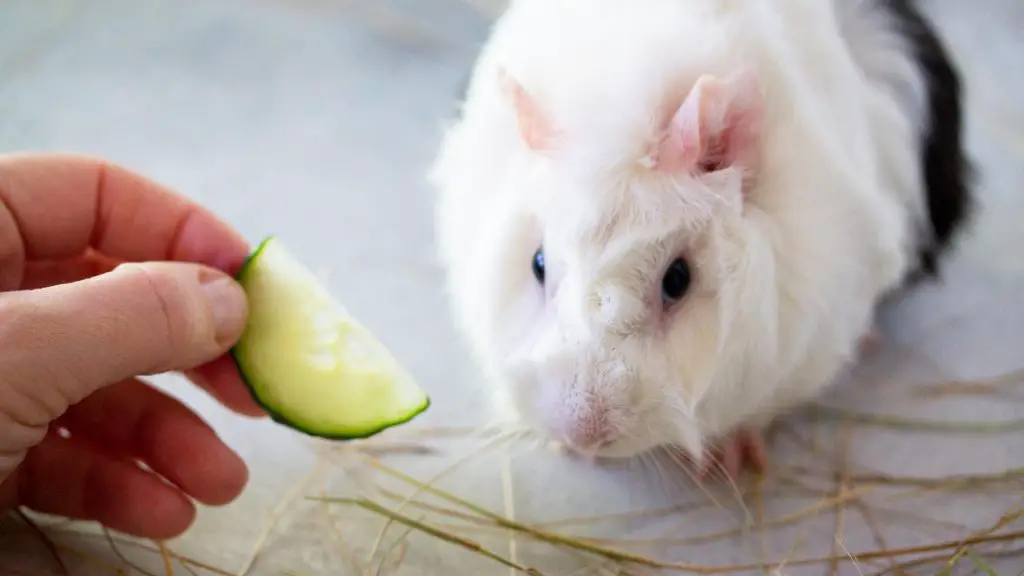
Can Guinea Pigs Eat Cucumber Everyday?
Guinea pigs shouldn’t eat cucumbers every day because they need a diverse diet with different vegetables and fruits so they can get different vitamins and minerals. The cucumber is a safe veggie for the guinea pigs, but as a good rule of thumb, feed them with cucumbers only 2-3 times per week.
Can Guinea Pigs Eat Too Much Cucumber?
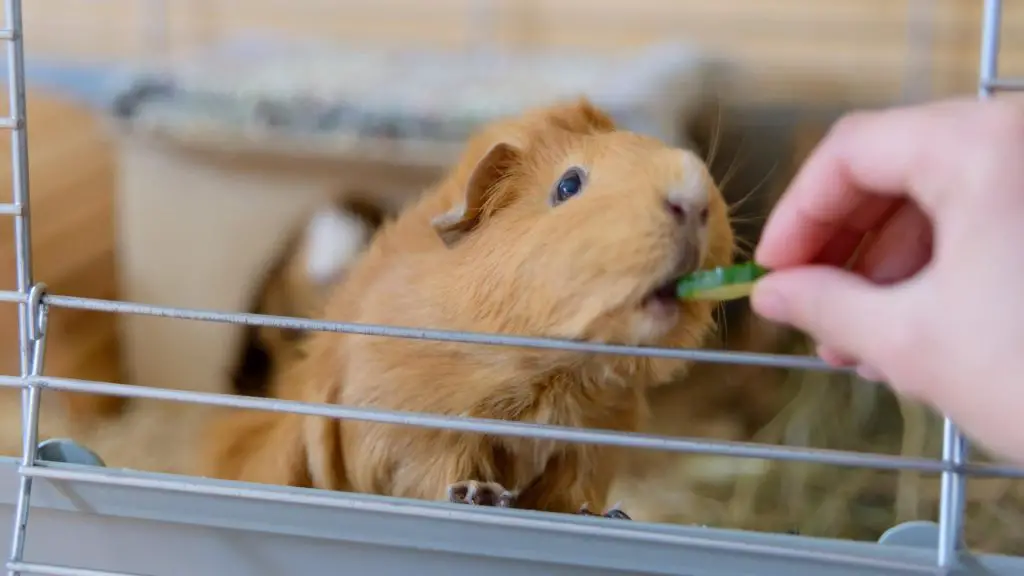
Guinea pigs shouldn’t eat too much cucumber at once as it can lead to some serious stomach problems. A few slices are enough, approximately 2-3 slices of normal thickness. This will also allow you to give the guinea pig other foods as well and add variety in the diet.
Do Guinea Pigs Like Cucumbers?
Most guinea pigs like cucumbers and some owners have said that there are situations when their guinea pigs will even fight over cucumbers. But also there is a possibility that your guinea pigs will not like the cucumber and that’s completely normal because guinea pigs have their personal taste preference, just like us humans.
If your guinea pigs don’t like cucumbers, you can serve them other veggies, such as spinach, celery, tomatoes, carrots, and cauliflower. Also, you can try to serve the cucumber to the cavies along with another safe veggie. Let’s say, a small leaf of romaine lettuce with cucumbers inside and small pieces of bell pepper, broccoli, or any other veggie allowed for guinea pigs.
Can Baby Guinea Pigs Eat Cucumbers?
Baby guinea pigs are very small and sensitive creatures and during that time they need special care and diet. Baby guinea pigs can’t eat cucumbers because they only need mother’s milk during the first few weeks. Also, you need to introduce them to alfalfa hay, pellets, and water.
Finally, after a few weeks, you can give baby guinea pigs some small amounts of cucumbers and also other fruits and vegetables. When giving baby guinea pigs fruits and vegetables for the first time, be sure to follow their reactions so you can notice if they don’t like something or if they are allergic to certain foods.
More Information About Guinea Pigs and Cucumbers
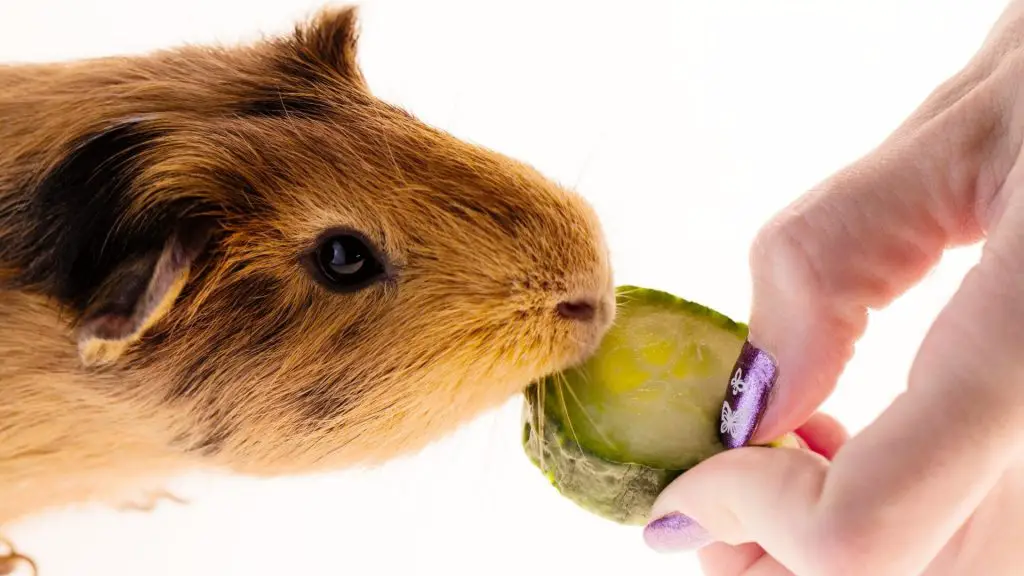
In the following sections, you can read more about what parts of cucumbers guinea pigs can eat and if they are allowed to eat some special types of cucumber. Let’s find out!
Can Guinea Pigs Eat Cucumber Seeds?
Guinea pigs can eat cucumber seeds because these seeds are very small and soft. They don’t have any toxic substances that can be fatal for guinea pigs.
But for safety, we recommend to slice the cucumber in half and try to remove some bigger seeds that you can remove with a hand or knife. Do this in order to avoid any choking hazards and to ease the guinea pig’s feeding process.
Can Guinea Pigs Eat Cucumber Peels/Cucumber Skin?
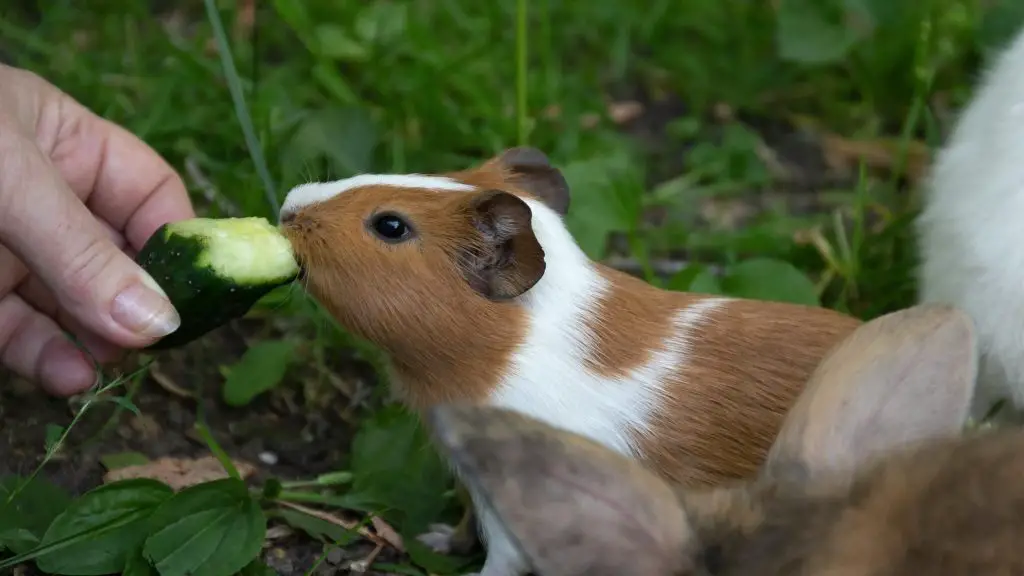
Guinea pigs can eat the skin of a cucumber and it is completely safe for them. Cucumber peels or skin contain many nutrients such as vitamins, minerals, and a good amount of fiber that are beneficial for guinea pigs.
So, every part of the cucumber is safe for the guinea pig. Make sure to wash the cucumber well before feeding the cavy. You can choose to peel it if you want to. However, there is no need for that. The skin is safe as we have mentioned.
Can Guinea Pigs Eat Cucumber Leaves?
Guinea pigs can eat cucumber leaves, but only in moderation. This means they can only consume it in small amounts and not every day.
If you feed your guinea pigs with too much cucumber leaves, they can get some digestive problems such as diarrhea or vomiting. Also, feed them only fresh, young, and raw cucumber leaves and wash them thoroughly with water before giving them to guinea pigs.
Can Guinea Pigs Eat Lemon Cucumbers?
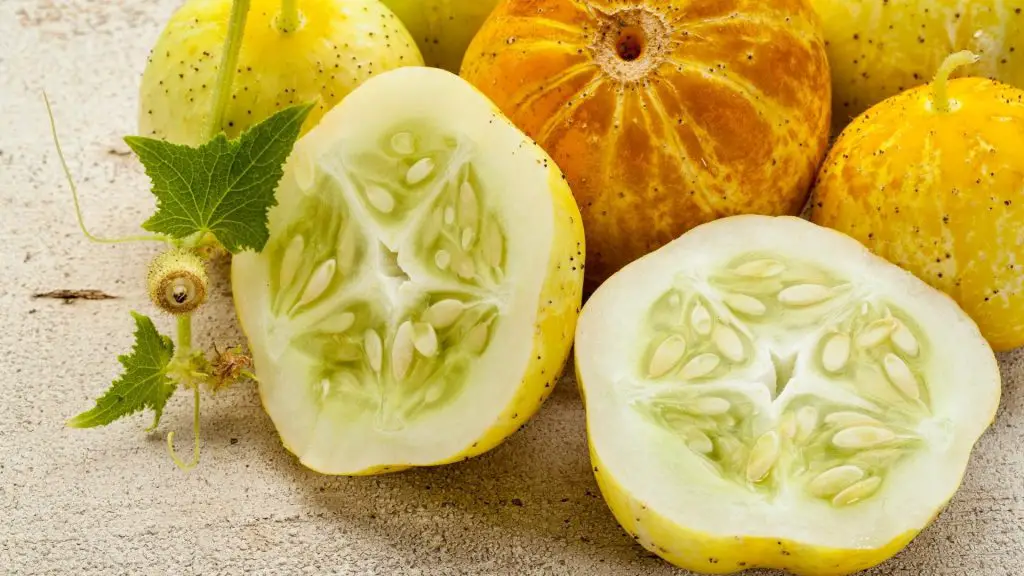
Lemon cucumbers are small, yellow and round in shape. Guinea pigs can eat lemon cucumbers but only in moderation similarly to regular cucumbers. These cucumbers are only in color similar to lemons. Their skin is thin and they have a sweeter, milder taste, and a crispy texture.
Lemon cucumbers contain vitamins such as vitamin C and vitamin K, also minerals such as potassium and calcium, as well as fiber and many other antioxidants. It is very similar in nutritional value to regular cucumbers.
Can Guinea Pigs Eat Lebanese Cucumbers?
Guinea pigs can Lebanese cucumbers but only in moderation. Lebanese cucumbers are small, mild, have smooth skin, and they are almost seedless. These cucumbers have many beneficial nutrients for guinea pigs, such as vitamin C, vitamin A, vitamin B6 and they are also low in calories.
Can Guinea Pigs Eat Mini Cucumbers?
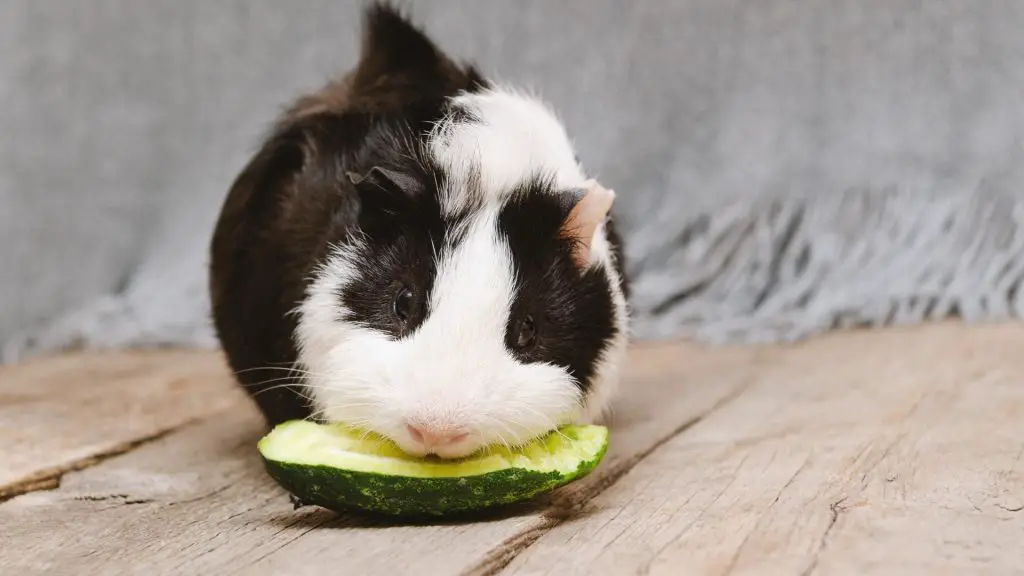
Guinea pigs can eat mini cucumbers. These are regular cucumbers that haven’t grown properly and this classification or a name exists only in stores. Mini cucumbers are seedless, juicy, and crunchy with a low amount of calories and fat. They have an extra-thin skin and are completely safe for guinea pigs.
However, pickled cucumbers are not a safe food for guinea pigs. Guinea pigs can’t eat pickled vegetables or any other processed or cooked foods because they can be very harmful to their sensitive digestive system.
Can Guinea Pigs Eat Persian Cucumbers?
Guinea pigs can eat Persian cucumbers. They have an excellent amount of vitamins such as vitamin C and vitamin A and dietary fiber. But also feed Persian cucumbers to guinea pigs only in moderation. These types of cucumbers are small, nearly seedless with thin skin, crispy in texture, and mild in taste.
Can Guinea Pigs Have Cucumber Juice?
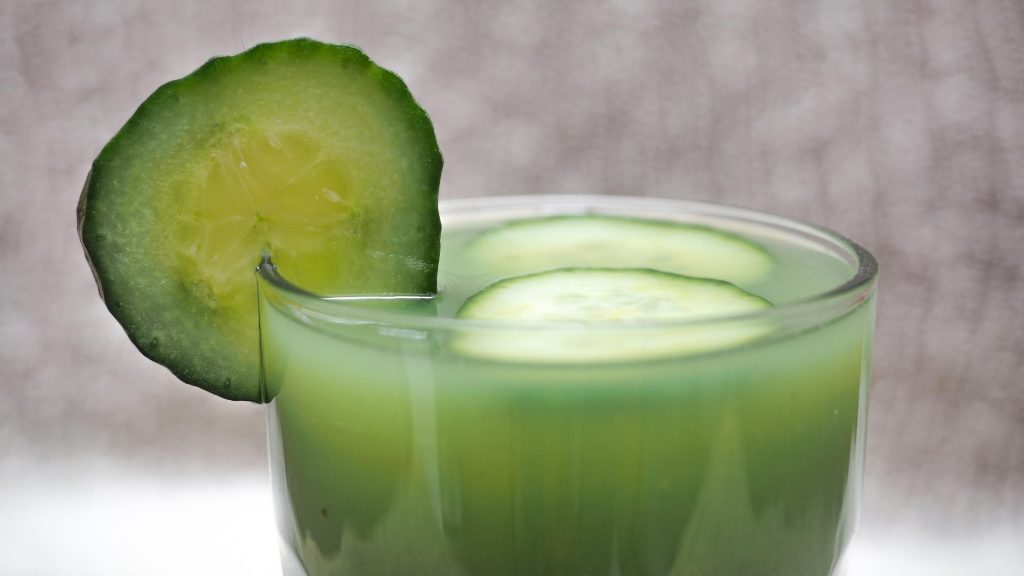
Guinea pigs shouldn’t drink cucumber juice or any other juice that you can buy in stores. Commercial juice can cause serious stomach problems in guinea pigs because it contains high levels of sugar and also preservatives.
You can provide guinea pigs only with homemade juice with no added sugars and chemicals. But regardless, fresh water is the favorite drink of guinea pigs. They always need to have functional water bottles filled with fresh and cold water in the cage.
Quick Facts on Cucumber
The following are some of the quick facts about cucumber:
- Cucumbers have a waxy coating that is able to remove ink or stains from the skin.
- Cucumbers contain compounds like lignans (pinoresinol, lariciresinol, and secoisolariciresinol) that can help in preventing different cancers.
- Sunburnt skin can be relieved when cucumber is placed over it.
- The first domestically grown cucumbers date back to 2nd millennia BC, in India.
- Christopher Columbus brought cucumbers to Haiti back in 1494 and distributed them afterwards.
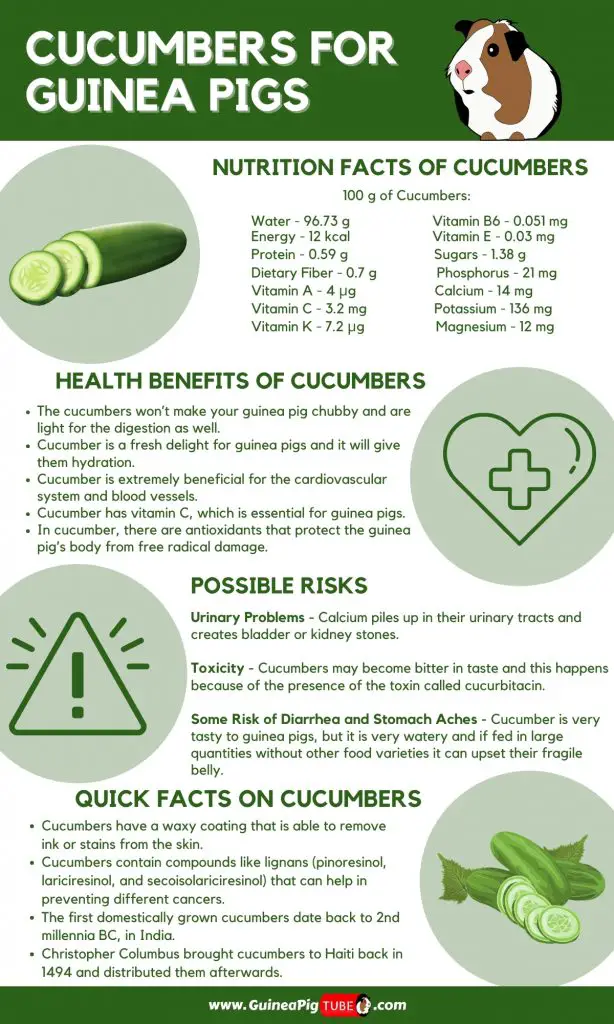
With food, you should be careful what to choose. If you are not sure what to feed them but believe your little piggies deserve some great treats, check our Helpful Guide to the Best Guinea Pig Treats to get some ideas.
We have also made a full list of foods that guinea pigs can and can’t eat (150+ Types of Foods). Be sure to also check our recommended products page for everything you will ever need to assure a happy life for your Guinea Pigs. Hope this information was helpful and you have found the answer you were looking for.
List of Sources
Nutrient Requirements of Laboratory Animals: Fourth Revised Edition
Vitamin C Requirements of the Guinea-Pig
Dietary Requirements of the Guinea Pig With Reference to the Need for a Special Factor
The Effects of Diet on Anatomy, Physiology and Health in the Guinea Pig
